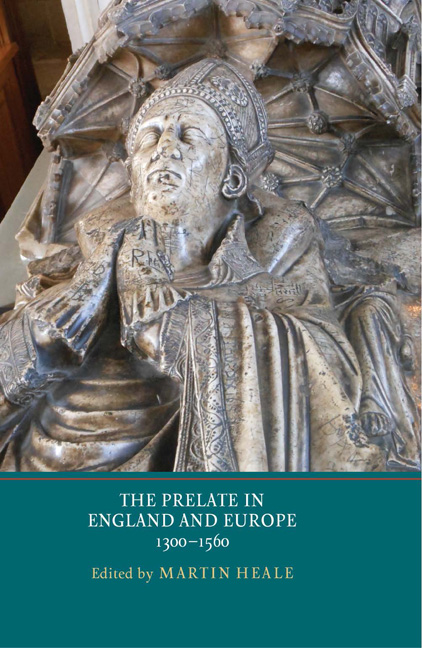Book contents
- Frontmatter
- CONTENTS
- List of Illustrations
- List of Contributors
- Preface and Acknowledgements
- List of Abbreviations
- Introduction
- Part I Prelates and Power
- Part II Patronage and Learning
- An Abbot and His Books in Late Medieval and Pre-Reformation England
- Prelates and the Provision of Books: Bishop John Carpenter's Carnary Library
- The Bishops and the Printers: Henry VII to Elizabeth
- Part III Identity and Display
- Part IV Attitudes towards Prelacy
- Index of People and Places
- Index of Subjects
- YORK MEDIEVAL PRESS: PUBLICATIONS
An Abbot and His Books in Late Medieval and Pre-Reformation England
from Part II - Patronage and Learning
Published online by Cambridge University Press: 05 November 2014
- Frontmatter
- CONTENTS
- List of Illustrations
- List of Contributors
- Preface and Acknowledgements
- List of Abbreviations
- Introduction
- Part I Prelates and Power
- Part II Patronage and Learning
- An Abbot and His Books in Late Medieval and Pre-Reformation England
- Prelates and the Provision of Books: Bishop John Carpenter's Carnary Library
- The Bishops and the Printers: Henry VII to Elizabeth
- Part III Identity and Display
- Part IV Attitudes towards Prelacy
- Index of People and Places
- Index of Subjects
- YORK MEDIEVAL PRESS: PUBLICATIONS
Summary
The century before the break with Rome witnessed the triumph of the bookish prelate. No longer was a place among the ‘princes of the priest-hood’ (as one contemporary preacher pictured them) a likely prospect for those most unlikely clerks whose conspicuous promotion, powered by royal patronage, roused outrage and scorn from the writing desks of the clerical establishment. Such men had seen something of an Indian Summer under the last of the Plantagenets, when plague and political unrest had claimed more than one learned prelate and the power of clergie to mislead church and people had become a matter of public alarm. Here there were still rewards for the unschooled government servant, the adept, such as William of Wykeham, whose twenty-five years at Windsor won him Winchester, and the (reputedly) inept, such as Roger Walden, an un-watered fish, if ever there was one, in his twenty-three months at Canterbury. Yet these men were almost the last of their kind. In fact it was Thomas Arundel, to whom Walden played interloper, and often himself represented as the archetype patrician prelate, who raised a succession of schoolmen on his return: the ascent of Repton [Repingdon] to Lincoln (1405), Skirlaw to Durham (1406), Courtenay to Norwich (1413), Chichele to St David's (1410), Patrington to Chichester (1415) positioned learned, indeed academic, prelacy at the compass points of the provincial church.
- Type
- Chapter
- Information
- The Prelate in England and Europe, 1300–1560 , pp. 101 - 126Publisher: Boydell & BrewerPrint publication year: 2014



